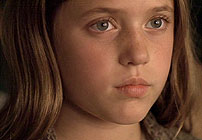|
|
|
|
A
Little Princess
|
 |
|
A Little Princess, the adaptation of a Frances Hodgson Burnett novel, was no doubt prompted by the success of Agnieszka Holland's version of Burnett's The Secret Garden (1993). It has some of the warmth of Gillian Armstrong's Little Women (1994), but for the most part its cinematic antecedents are further back in time: David Lean's Great Expectations (1946) comes to mind, as does Alfred Hitchcock's Rebecca (1940). The story, co-scripted by Richard LaGravenese of The Bridges of Madison County (1995) fame, begins in the India of 1914. Sara (Liesel Matthews) lives in an enchanted world with her father, Captain Crew (Liam Cunningham). When he is called to war, Sara is relocated in a snooty New York college for girls. Here, Sara's feisty, imaginative spirit wins friends but alienates the fearsome Miss Minchin (Eleanor Bron) – a definite disadvantage when hard times strike. The most compelling aspect of A Little Princess is its portrayal of the father-daughter bond. As depicted by the film, it is a frankly romantic union. Crew's wife is dead, and he passes onto Sara the locket he once gave her. In the course of the plot this trinket becomes an almost totemic object, a conduit for the emotion that passes between this pair even when they are apart. There is nothing perverse about this father-daughter relationship, but there is certainly a heightened, thrilling edge to it. The story is about a girl's proud selfhood, but Sara's very knowledge of her self is dependent upon paternal recognition. "Every girl is a princess!" she yells at a peak dramatic moment, adding: "Didn't your father ever tell you that?" Such dependence on dear old Dad of course generates a terrifying possibility: that an explicit rejection by him is, for the daughter, a kind of soul murder. As it becomes a fanciful melodrama based on those old staples of amnesia and misrecognition, the film flirts with this undertone of psychological horror. Alfonso Cuarón is an emerging director with a lot of flair and, as yet, no discernible personal signature. Previous to this he made an erotic comedy in his homeland of Mexico, Sólo con tu pareja (1991), and contributed a superbly claustrophobic episode to the television noir series Fallen Angels (1993). Here, Cuarón's delicately crafted work recalls Peter Weir's Dead Poets Society (1989). The interplay of lush lighting, shallow focus and intense close-ups produces a near-hallucinatory effect – and that, combined with the high artifice of Bo Welch's production design, gives the film a charged, fairy-tale aura reminiscent of Michael Powell (The Red Shoes, 1948). A Little Princess is a modest but excellent film. It will be a pity if it is overlooked by audiences. Neither a simple kids film nor a two-tier entertainment pitched differently to children and adults, it is – like The Secret Garden or Bertolucci's Little Buddha (1993) – a brave example of what could be called a childlike cinema for filmgoers of all ages. LATER Cuarón: Great Expectations, Y Tu Mamá Tambíen, Fallen Angels © Adrian Martin January 1996 |
![]()